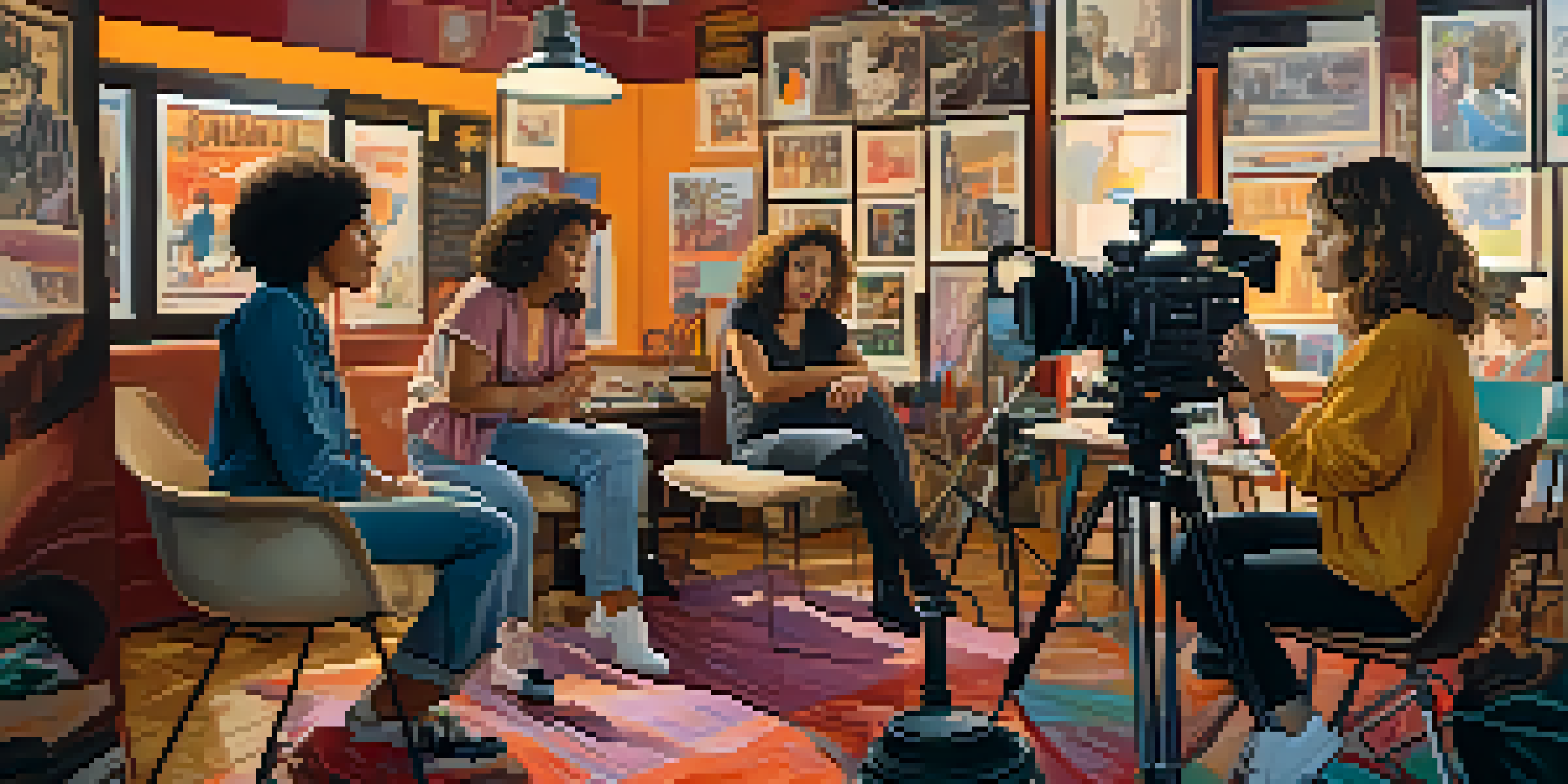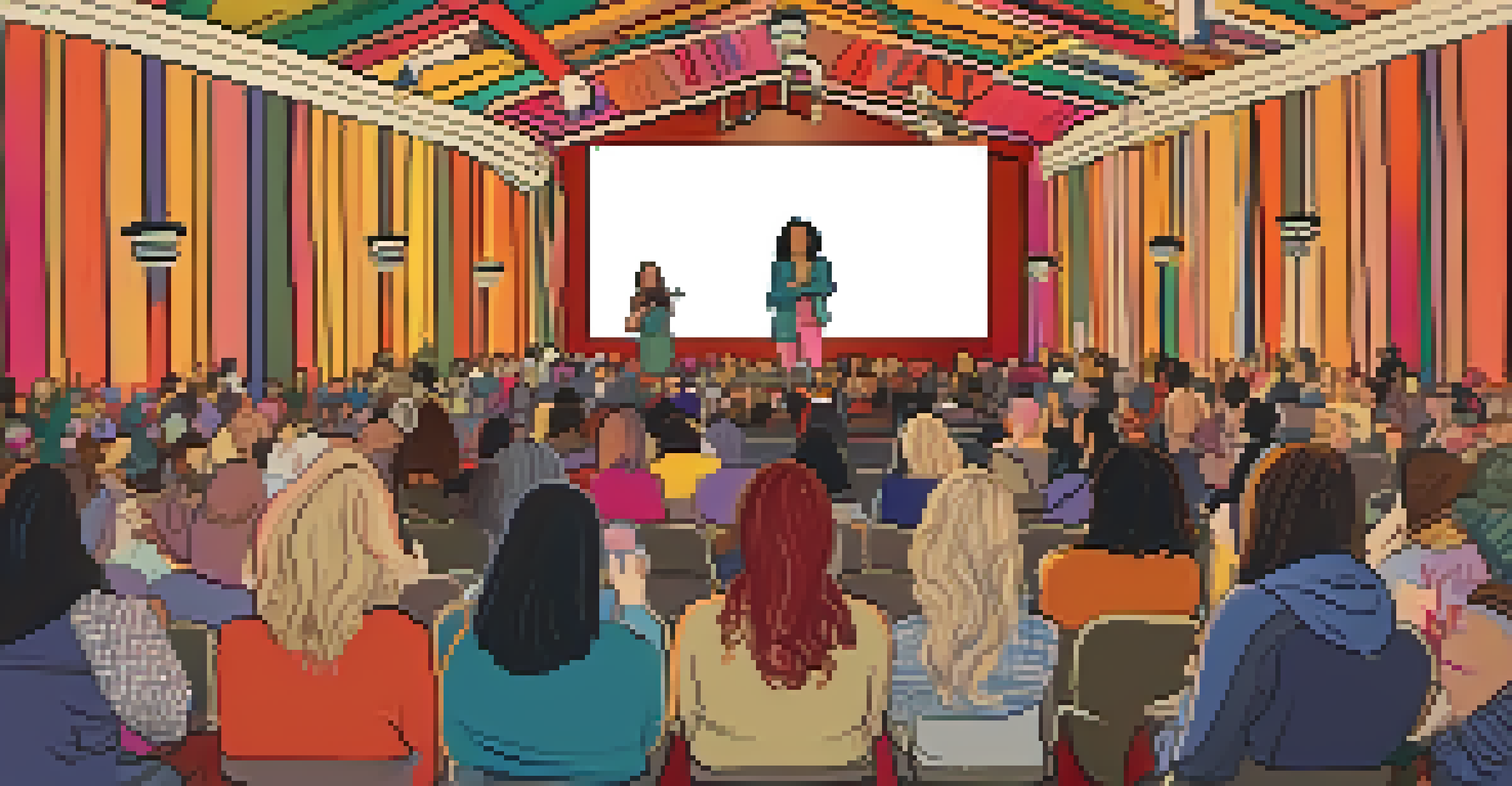Women in Independent Filmmaking: Breaking Barriers

The Rise of Women in Independent Filmmaking
In recent years, the independent film scene has seen a surge of female talent behind the camera. Women are not just participating; they are leading the charge, telling stories from diverse perspectives that resonate with audiences. This shift signifies a broader cultural change, where women's voices are being recognized and celebrated in a traditionally male-dominated industry.
If you can see it, you can be it.
Independent filmmaking offers a unique platform for women to experiment with storytelling free from the constraints of mainstream Hollywood. With lower budgets and more creative freedom, female filmmakers can explore nuanced narratives that reflect their experiences and those of others. This environment encourages innovation, allowing women to carve out their space and redefine the filmmaking landscape.
As these filmmakers gain visibility, they inspire a new generation of women to pursue their passions in film. Young girls and aspiring filmmakers are now able to see role models who look like them, making the dream of creating films feel more attainable. This ripple effect is crucial for the continued evolution of the industry, fostering a rich tapestry of voices and stories.
Challenges Faced by Women Filmmakers
Despite the progress made, women in independent filmmaking still encounter significant challenges. These can range from limited access to funding and resources to navigating a landscape that often prioritizes male narratives. Many female filmmakers find themselves battling stereotypes and bias that can undermine their authority and vision.

Funding remains a critical hurdle, as women often receive a smaller percentage of grants and investments compared to their male counterparts. This disparity can stifle creativity and limit the scope of projects that can be pursued. By highlighting these issues, we can better understand the systemic barriers that need to be dismantled for true equality to be achieved.
Women are Leading Indie Filmmaking
A surge of female talent is reshaping independent filmmaking, allowing for diverse stories that resonate with broader audiences.
Moreover, the journey of a woman filmmaker can be lonely, with fewer networking opportunities and mentorship programs available. Building a support system is vital, and many women in the industry are now coming together to create communities that uplift and empower one another. These networks are essential for sharing resources, experiences, and encouragement.
Influential Women in Indie Film History
Throughout the history of independent filmmaking, there have been several trailblazing women who paved the way for future generations. Directors like Mira Nair and Julie Dash have used their films to confront social issues and bring marginalized voices to the forefront. Their work not only challenged the status quo but also opened doors for other women to follow suit.
The best way to predict the future is to create it.
As we look back, it's essential to acknowledge the contributions of these pioneers who have made significant impacts on the industry. Their films often reflect a blend of personal experiences and cultural narratives, allowing viewers to connect with diverse stories. This legacy continues to inspire new filmmakers to explore their unique voices in the vast landscape of cinema.
These influential women have demonstrated that storytelling is a powerful tool for change. By sharing their journeys and struggles, they have sparked conversations around representation and equity in film. Their legacies remind us that the fight for gender equality in filmmaking is ongoing, and every new project is a step closer to balance.
The Importance of Representation in Film
Representation matters in film, as it influences how stories are perceived and consumed by audiences. When women tell their own stories, it adds depth and authenticity that can resonate more profoundly with viewers. This representation not only validates women's experiences but also fosters understanding and empathy among diverse audiences.
Moreover, diverse storytelling enriches the cinematic landscape, offering fresh perspectives that challenge societal norms and stereotypes. Films created by women often address issues such as gender equality, identity, and intersectionality, allowing for a broader dialogue around these topics. This shift in narrative can lead to greater awareness and social change.
Challenges Still Persist for Women
Despite progress, women filmmakers face significant challenges, including funding disparities and limited networking opportunities.
As more women take the helm in independent filmmaking, the importance of representation becomes increasingly clear. Audiences are craving authentic stories that reflect the world around them, and women filmmakers are stepping up to meet this demand. The more diverse the stories we see on screen, the more inclusive and understanding our society becomes.
Emerging Technologies and Opportunities
The advent of new technologies has created exciting opportunities for women in independent filmmaking. With affordable filming equipment and editing software, aspiring filmmakers can now produce high-quality content without the need for extensive budgets. This democratization of filmmaking means that more voices, especially those of women, can be heard in a crowded industry.
Platforms like YouTube, Vimeo, and social media allow filmmakers to showcase their work directly to audiences, bypassing traditional gatekeepers. This shift empowers women to take control of their narratives and share their stories with the world. As they harness these tools, they can build their brands and communities, creating a loyal audience that supports their work.
Furthermore, the rise of streaming services is changing how films are distributed and consumed. Indie films created by women are gaining traction on these platforms, providing visibility that was previously difficult to achieve. This evolution is crucial for fostering a diverse range of stories, ensuring that women's voices are not only heard but celebrated.
The Role of Film Festivals in Supporting Women
Film festivals play a pivotal role in promoting independent filmmakers, particularly women. Events like the Sundance Film Festival and the Tribeca Film Festival have made concerted efforts to showcase female-directed films, providing a platform for these creatives to share their work with a broader audience. Such festivals often lead to networking opportunities that can be invaluable for aspiring filmmakers.
Moreover, many festivals have implemented initiatives specifically aimed at increasing female participation. These include mentorship programs, funding opportunities, and dedicated awards for women filmmakers. By prioritizing female voices, these festivals contribute to a more equitable industry, encouraging a diverse range of narratives to flourish.
Film Festivals Support Female Filmmakers
Film festivals play a crucial role in promoting women in film by providing visibility, networking, and funding opportunities.
The exposure gained at film festivals can significantly impact a filmmaker's career, often leading to distribution deals and critical acclaim. As more women receive recognition for their work, the industry moves closer to achieving parity. Supporting women filmmakers through festivals is not just beneficial for the individuals involved; it enriches the entire film community.
The Future of Women in Independent Filmmaking
Looking ahead, the future of women in independent filmmaking is bright, filled with potential and promise. As more women enter the industry, they will continue to challenge norms and push boundaries, ensuring that diverse stories are told. This new wave of filmmakers is driven by passion and a commitment to authenticity, making it an exciting time for cinema.
Moreover, the ongoing conversation about gender equality in the film industry is gaining momentum. Advocacy groups and initiatives aimed at promoting female filmmakers are becoming more prevalent, leading to tangible changes in hiring practices and funding opportunities. This collective effort will be instrumental in shaping a more inclusive future for filmmakers of all backgrounds.

As the barriers continue to break down, we can expect to see a richer tapestry of stories that reflect the world we live in. The resilience and creativity of women in independent filmmaking will undoubtedly inspire future generations to share their unique experiences. In this evolving landscape, every voice matters, and together, we can create a more equitable film industry.